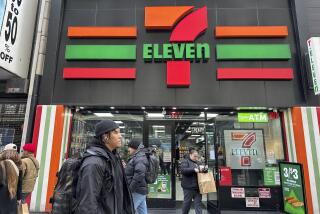Possible Majority : Investor Haft Sets Sights on Dayton Hudson
- Share via
Apparently undeterred by tough new anti-takeover legislation in Dayton Hudson’s home state of Minnesota, corporate raider Herbert H. Haft ended weeks of suspense by announcing his intention to buy a sizable stake in the retailer and possibly seek majority control.
In a July 23 letter that Dayton Hudson made public Friday, Haft told Kenneth A. Macke, the retailer’s chairman, that a group that Haft controls called Madison Partnership intends to buy outstanding common shares “in an amount exceeding $15 million” and “may, depending upon circumstances during the next 12 months, purchase amounts of 50% or more.”
Haft added that he is notifying federal authorities to comply with the Hart-Scott-Rodino antitrust law, which requires that the Federal Trade Commission be told when an individual or partnership intends to buy $15 million or 15% of a company.
At Dayton Hudson’s current stock price, $15 million would represent about 0.3% of the 97.4 million outstanding common shares, and it would take about $2.5 billion to purchase half the company.
Dayton Hudson, the Minneapolis-based parent of the Target and Mervyn’s chains, launched a campaign in early June to strengthen the state’s anti-takeover law after learning that Dart Group--a Landover, Md., holding firm controlled by Haft and his son Robert--had bought an as-yet-undetermined stake in the company.
The Minnesota Legislature passed that law June 25, allaying fears of a hostile bid. As a result, the Haft letter, though not a full-fledged takeover proposal, came as somewhat of a surprise to the company and analysts.
“We did not expect to get it,” said Dayton Hudson spokeswoman Ann Barkelew.
With an unknown but presumably sizable percentage of Dayton Hudson stock now in the hands of arbitrageurs, or professional stock speculators, Dayton Hudson might find it difficult to thwart Haft’s stock purchases.
“I have to be a big proponent of letting the open market function,” said Mark D. Witmer, an analyst with the Wessels, Arnold & Henderson brokerage in Minneapolis. “If . . . people are willing to sell (shares), then for management to try to stand in the way of that is not necessarily looking out for shareholders’ best interests.”
Speculation on Motives
In trading Friday on the New York Stock Exchange, Dayton Hudson shares soared $4.375 to $52, prompting analysts to speculate that investors foresee the retailer taking possibly dramatic steps to avoid a takeover. Volume of more than 2.9 million shares made Dayton Hudson the exchange’s third most active issue.
Monroe H. Greenstein, an analyst with Bear, Stearns & Co., said the letter might indicate that Haft wants to muscle his way onto the company’s board and perhaps force a restructuring. He added: “They might want control of the company or could be making a big investment with the hope of selling it back to the company at a premium,” known in takeover parlance as “greenmail.”
A provision of the toughened Minnesota law would restrict greenmail payments, but that aspect does not take effect until next March 1.
One significant provision already in effect would prohibit an investor that takes control in a hostile takeover from selling any of the target company’s assets for five years. That is designed to make lenders reluctant to finance such takeovers, many of which are paid off by the sale of assets.
In testimony last month to Minnesota legislators, Macke said the company did not favor selling off divisions or finding a “white knight” purchaser, but he did not specifically rule out the payment of greenmail.
Over the last three years, Dart Group has profited heavily from payments and stock profits in failed takeover attempts.
More to Read
Inside the business of entertainment
The Wide Shot brings you news, analysis and insights on everything from streaming wars to production — and what it all means for the future.
You may occasionally receive promotional content from the Los Angeles Times.











